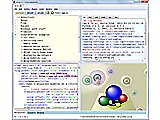
Leo is a programmers editor, suitable as IDE, and also provides PIM funtionality. It provides unqiue outlines which are represented in a tree, with view nodes being able to occur multiple times. It's fully scriptable in Python itself, where extensions can access outline data and Leos code directly, export to external files containing outline markup.
 Homepage
Homepage
 Download
Download
Recent Releases
5.0-a108 Nov 2014 11:25
major feature:
Better compatibility with vim, Emacs, pylint and PyQt:
Optional native emulation of vim commands.
Full support for Emacs org-mode outlines.
Better support for pylint.
Support for both PyQt4 and PyQt5.
Better handling of nodes containing large text:
Idle time syntax coloring eliminates delay.
Optional delayed loading of large text.
Power features:
Leo available via github repository.
File name completion.
Cloned nodes expand and contract independently.
@data nodes can be composed from descendant nodes.
No need to change Leo's main style sheet:
it can be customized with @color and @font settings.
@persistence nodes save data in @auto trees.
A plugable architecture for @auto nodes.
The style-reload command changes Leo's appearance instantly.
Important new plugins for tagging, display and node evaluation.
For beginners:
Leo's default workbook files contains Leo's quickstart guide.
Hundreds of new/improved features and bug fixes.
